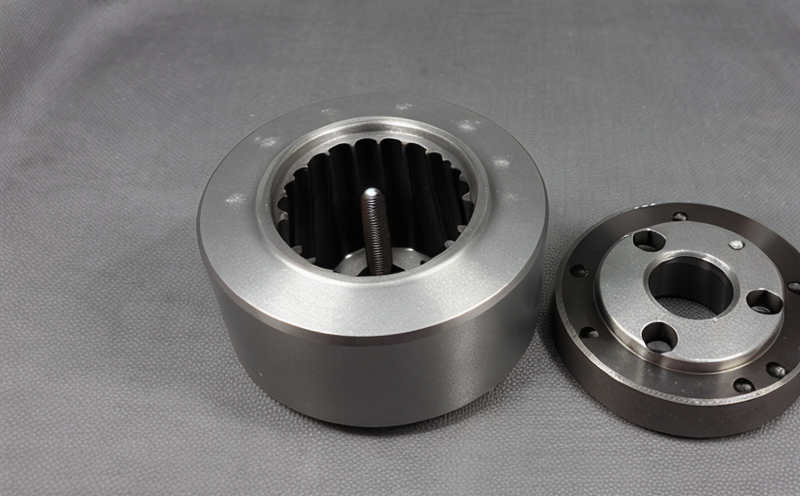ISO 604 Compression Testing of Additively Manufactured Plastics
The ISO 604 standard specifies methods for determining compressive properties of plastics under a constant load. For additively manufactured plastics, this test is particularly valuable in ensuring the mechanical integrity and reliability of parts produced through additive manufacturing processes like selective laser sintering (SLS) or electron beam melting (EBM).
These materials are often used in aerospace, automotive, and medical industries where component performance and safety are paramount. The compressive strength determined by this test is a critical parameter that informs design engineers about the mechanical behavior of parts under compression.
The testing process begins with the preparation of specimens according to ISO 604 requirements. Specimens are typically cylindrical or disk-shaped, with dimensions defined in the standard. Before compression testing, the samples must be conditioned at specific humidity and temperature levels for a specified duration to ensure consistent mechanical properties.
Compression tests are conducted using a universal testing machine equipped with an appropriate fixture capable of applying axial loads. The load is applied at a constant rate until failure occurs, which allows for the determination of key parameters such as compressive strength (MPa) and modulus of elasticity.
The results from this test provide essential data that can be used to validate design specifications, monitor process consistency, and ensure compliance with industry standards. For instance, in aerospace applications, the compressive properties of parts like brackets or gears must meet stringent requirements ensuring they can withstand high loads without failure.
Moreover, these tests help identify potential issues early in the manufacturing process. By identifying weak points or inconsistencies, manufacturers can make necessary adjustments to their processes, improving overall product quality and safety.
In summary, ISO 604 compression testing of additively manufactured plastics is a crucial step in ensuring that parts meet required performance standards. It provides valuable insights into the mechanical behavior of these materials under compressive stress, aiding both R&D teams and production facilities in optimizing their processes for better outcomes.
- Customer Impact: Ensures product reliability through consistent quality control measures.
- Safety Assurance: Reduces risks associated with failure due to poor mechanical properties.
- Process Optimization: Identifies areas needing improvement for enhanced efficiency and effectiveness.
Why Choose This Test
The ISO 604 compression test offers several advantages that make it an indispensable tool in the quality assurance toolkit of any manufacturing facility dealing with additively manufactured plastics. One key benefit is its ability to provide robust data on compressive strength and modulus, which are critical for assessing the mechanical integrity of parts.
Another advantage lies in its role as a non-destructive testing method when conducted correctly. This means that samples can be reused after testing if needed, saving resources while maintaining accuracy. Additionally, this test helps manufacturers stay compliant with international standards like ISO 604, ensuring they meet regulatory requirements and industry expectations.
Furthermore, the detailed insights gained from this test facilitate continuous improvement in manufacturing processes by highlighting areas where adjustments can be made to enhance performance. This proactive approach not only improves product quality but also enhances customer satisfaction, leading to higher market competitiveness.
In conclusion, choosing ISO 604 compression testing for additively manufactured plastics offers a comprehensive solution that addresses multiple aspects of quality assurance and process optimization. Its reliability and accuracy make it an essential part of any modern manufacturing strategy aimed at delivering superior products consistently.
Customer Impact and Satisfaction
The impact of ISO 604 compression testing on customer satisfaction is significant. By ensuring that additively manufactured plastics meet stringent mechanical performance standards, manufacturers can deliver products that are reliable and safe for their intended applications. This not only enhances the reputation of the company but also fosters long-term relationships with customers.
Customers benefit from knowing that each product they receive has been subjected to rigorous testing procedures aimed at minimizing risks associated with potential failures. This transparency builds trust, leading to increased customer loyalty and repeat business. Additionally, meeting regulatory requirements through such tests demonstrates a commitment to quality, which is highly valued by discerning customers across various industries.
Moreover, the enhanced reliability of products due to thorough testing translates directly into improved user experiences. For instance, in medical devices where mechanical integrity could mean life or death differences, having tested components ensures better patient outcomes and overall satisfaction with the product.
Competitive Advantage and Market Impact
In today’s competitive market, companies that invest in comprehensive quality assurance measures like ISO 604 compression testing gain a significant edge over their competitors. By ensuring high standards of material performance, they can offer products that are not only more reliable but also safer for use.
From an operational perspective, maintaining consistent product quality through regular testing helps reduce waste and improve efficiency within production lines. This leads to cost savings that can be passed on to customers or reinvested into further innovation, creating a virtuous cycle of improvement.
On the market front, companies demonstrating their commitment to excellence via such tests tend to attract more attention from potential clients looking for partners who prioritize quality above all else. This enhanced visibility often translates into increased sales and broader market reach, contributing positively to overall business growth.





